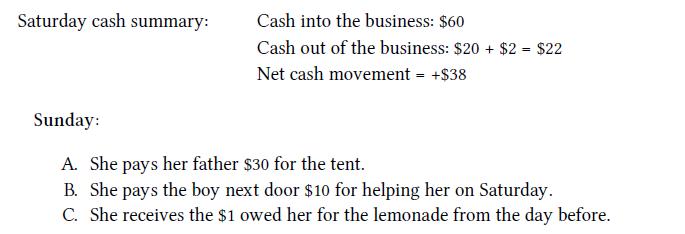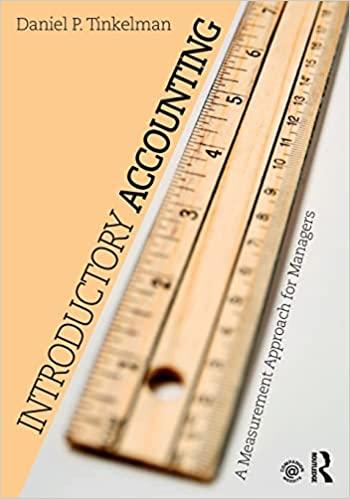A number of the principles of accrual accounting can be illustrated with a simple example. An 11-year-old
Question:
A number of the principles of accrual accounting can be illustrated with a simple example. An 11-year-old girl, Mary, decides to make a little bit of money by setting up a lemonade stand. She plans to sell lemonade every Saturday for 10 weekends. The following events take place on the first weekend:
Friday:
A. She takes $25 from her drawer, and puts it in a box that she will use for the lemonade stand business.
B. She gives her mother the money to buy some lemonade and cups. The lemonade and cups cost $10.
C. She asks her father to make a little tent for her to sell the lemonade under, which she expects to use for all 10 weekends. It cost $30. She promises to pay her father back after the weekend is over.
D. A neighbor gives her $4 as payment in advance for four cups of lemonade. The neighbor will come by on Saturday and get the four cups.
A. She sells so many cups of lemonade she has to ask her mother to buy another $20 worth of lemonade.
B. She collects $60 from people who buy lemonade. She actually gives out 65 cups of lemonade, since the neighbor who paid in advance comes by and she also gives a cup to a friend who promises to give her a dollar the next day.
C. She is so busy she asks a little boy next door to help her. She promises to give him $10 on Sunday.
D. At the end of the day, she realizes she has ingredients left that cost $4.
E. She takes $2 out of the box, and buys candy for a treat. She has worked hard.

Questions:
1.If Mary just used cash-basis accounting, would she consider her business profitable or unprofitable on
a. Friday?
b. Saturday?
c. Sunday?
2.Under accrual accounting:
a. Which of the events represent buying an asset?
b. Which of the events involve creating a liability?
c. Which of the events represent earning revenue? And when is revenue earned?
d. Which of the events represent incurring an expense?
e. Over what period of time should the cost of the lemonade stand be allocated to an expense?
f. How should the initial movement of $25 to the business be treated? Should it be considered part of the business’s income?
g. How should the movement out of $2 for a treat for Mary be treated? Is it an expense?
3.Using the data in the problem, compute what you think the income under the accrual basis would be for:
a. Friday
b. Saturday
c. Sunday.
4.Using the data in the problem, compute what you think the assets, liabilities, and equity of this business are on Saturday evening.
5.For each of the events, indicate how you think it affects the fundamental accounting equation on that day.
Step by Step Answer:

Introductory Accounting A Measurement Approach For Managers
ISBN: 9781138956216
1st Edition
Authors: Daniel P. Tinkelman





